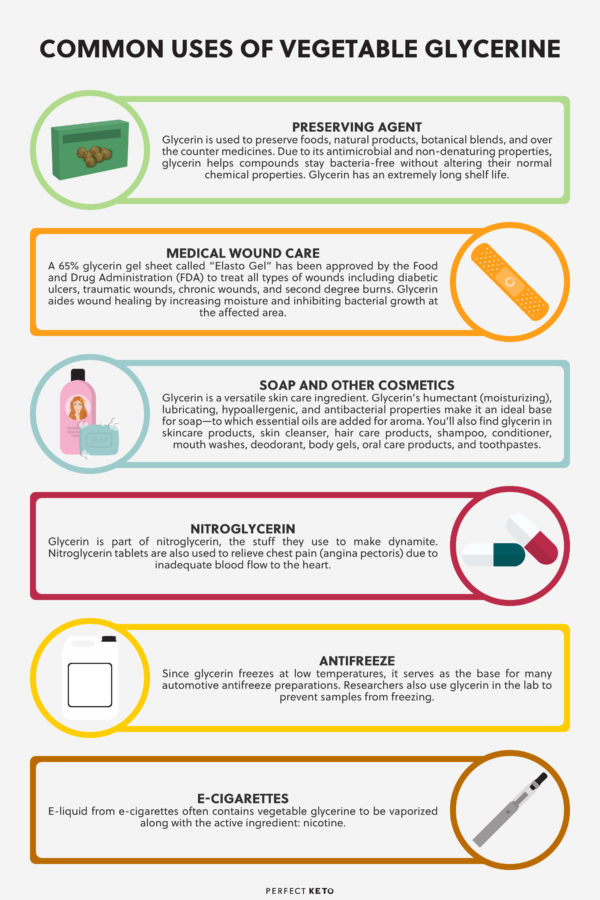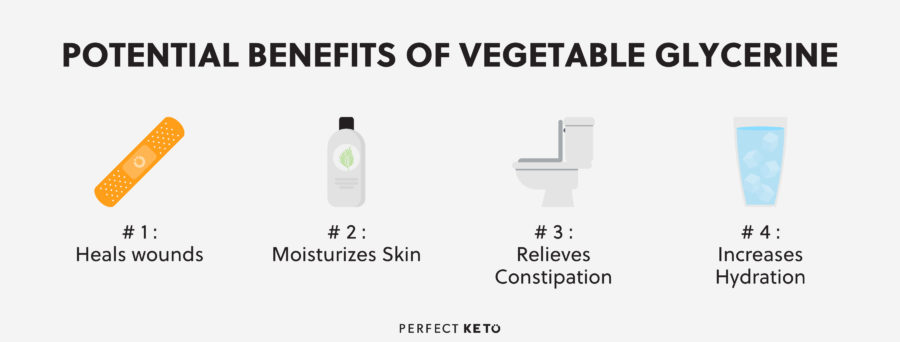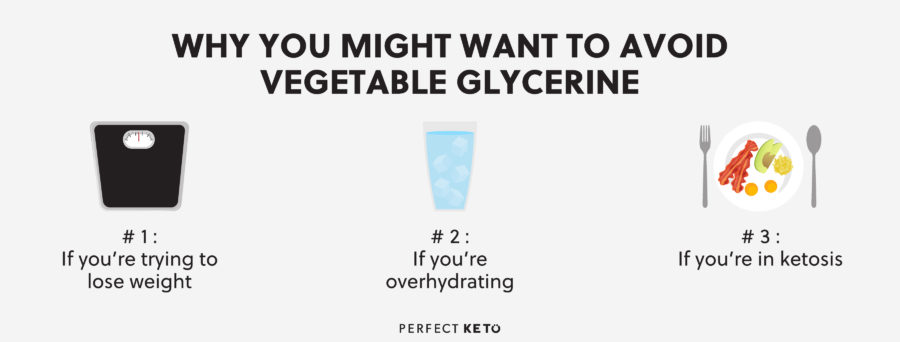If you’ve read an ingredients label lately, you’ve probably seen “vegetable glycerine” emblazoned on the packaging.
Vegetable glycerine—also called glycerol or glycerin—is the plant-derived version of a molecule produced naturally in your body. This nontoxic compound is found in many products, from soaps to moisturizer to foods to e-cigarettes.
Often used as a sweetener and preservative, glycerin is colorless, odorless, mild, sweet, and considered quite safe for human consumption.
In this article, you’ll learn all about vegetable glycerine: basic science, uses, potential benefits, and drawbacks.
You’ll also discover if vegetable glycerine is keto.
What is Vegetable Glycerine?
Vegetable glycerine is a sugar alcohol produced from plant matter—usually soybeans, coconut oil, or palm oil. (Ideally non GMO palm oil). These vegetable oils are heated or pressurized to synthesize glycerin.
Vegetable glycerine is used as a moisturizing agent, a food preservative, in wound care, and even to make dynamite. The list of uses is long.
Vegetable glycerine is synthetically derived, but glycerin is also produced naturally in your body from glucose, protein, pyruvate, and a variety of other materials[*].
Glycerin is an important substance in human physiology. For example, glycerine acts as the backbone for the triglyceride molecule—essential for safe storage of energy. As the name suggests, triglycerides are just three fatty acids bound together by glycerol.
Glycerin is especially important when you deplete glycogen (stored glucose) during a fast. Glycerin, in fact, can be converted to glucose to fuel the brain and body[*]. The longer the fast, the more you rely on glycerine to meet glucose needs.
Important as it is, glycerin is not an essential nutrient. You don’t need to eat glycerin. You can produce your own.
Nonetheless, glycerin of all kinds (including vegetable glycerine) is considered safe and nontoxic at up to 5 grams per kilogram of body weight[*]. Even if you consume 100% packaged foods, you probably won’t hit these limits for glycerine consumption.
It’s been shown that, when ingested, glycerin increases fluid retention. In other words, you hold onto more water. Depending on your situation, this may be a benefit or a drawback.
Later on, you’ll learn more about the pros and cons of vegetable glycerine. But first, a quick review of its uses.
Common Uses of Vegetable Glycerine
You needn’t go far to find vegetable glycerine. It’s a ubiquitous ingredient.
Here are the most common uses:

- Preserving agent. Glycerin is used to preserve foods, natural products, botanical blends, and over the counter medicines. Due to its antimicrobial and non-denaturing properties, glycerin helps compounds stay bacteria-free without altering their normal chemical properties. Glycerin has an extremely long shelf life.
- Medical wound care. A 65% glycerin gel sheet called “Elasto Gel” has been approved by the Food and Drug Administration (FDA) to treat all types of wounds including diabetic ulcers, traumatic wounds, chronic wounds, and second degree burns[*]. Glycerin aides wound healing by increasing moisture and inhibiting bacterial growth at the affected area.
- Soap and other cosmetics. Glycerin is a versatile skin care ingredient. Glycerin’s humectant (moisturizing), lubricating, hypoallergenic, and antibacterial properties make it an ideal base for soap—to which essential oils are added for aroma. You’ll also find glycerin in skincare products, skin cleanser, hair care products, shampoo, conditioner, mouth washes, deodorant, body gels, oral care products, and toothpastes.
- Nitroglycerin. Glycerin is part of nitroglycerin, the stuff they use to make dynamite. Nitroglycerin tablets are also used to relieve chest pain (angina pectoris) due to inadequate blood flow to the heart.
- Antifreeze. Since glycerin freezes at low temperatures, it serves as the base for many automotive antifreeze preparations[*]. Researchers also use glycerin in the lab to prevent samples from freezing.
- E-cigarettes. E-liquid from e-cigarettes often contains vegetable glycerine to be vaporized along with the active ingredient: nicotine.
Potential Benefits of Vegetable Glycerine
Researchers have linked vegetable glycerine to health benefits in a few small studies. To be clear, however, the quality of the evidence isn’t exactly grade A.

#1: Heals wounds
Infections are no small problem. According to one review, wound care costs the healthcare system over $7 billion per year[*].
To prevent wounds from becoming chronically infected—and to help them heal properly—appropriate wound dressing is essential.
Glycerin may help. It’s been shown, for instance, that glycerin possesses activity against bacteria, viruses, and fungi.
Glycerin also helps form a protective barrier over the wound, increasing moisture to speed the healing process. One glycerin based dressing, Elasto-Gel, is FDA approved for the treatment of all wounds[*].
#2: Moisturizes skin
Vegetable glycerine is a humectant, meaning it helps skin retain moisture. Because of this, pure vegetable glycerine is used in many moisturizing soaps and hydrating lotions that claim to give you “luxurious skin”.
In one study, ten days of treatment with 20% glycerin cream improved one marker of skin hydration in 17 volunteers—but failed to improve another called transepidermal water loss[*]. Also, the glycerin cream didn’t protect their skin from an SLS irritant.
Another study found that glycerin had softening (or emollient) properties on skin, though similar effects were found for paraffin oil and—yes—plain old water![*]. So no, glycerin isn’t exactly an outstanding moisturizer.
#3: Relieves constipation
Used rectally, vegetable glycerine draws water into the intestines, increasing fluid to relieve constipation. This has been shown.
In one study, researchers assigned 164 constipated patients to receive either a glycerin-based enema or traditional liquid soap emema. Results? Compared to the traditional soap suppository, the glycerin suppository had a much higher success rate. (97.5% vs. 81%)[*].
#4: Increases hydration
Taken alone, glycerin is quickly absorbed and processed by the liver and kidneys. Taken with water, however, glycerin shoves that water into various bodily tissues[*].
The “hyperhydration” effect of glycerin also means your kidneys retain more fluid. This just means that you pee out less water.
Performance benefits may follow. In one small controlled study, a glycerin supplement increased both power and aerobic performance in athletes performing a 20 meter shuttle run[*]. The gains, however, were fairly small.
Your Keto Partner in Crime

Embrace the Power of Quality Keto Products. Stay Fueled, Motivated, and Ready to Tackle Your Day.
HurryWhy You Might Want to Avoid It
In food, vegetable glycerine is safe and nontoxic. Nonetheless, you may want to avoid glycerin—especially glycerin supplements—in certain situations.

#1: If you’re trying to lose weight
Recall that glycerin causes increased water retention. Unsurprisingly, this extra water retention can lead to weight gain.
In the aforementioned glycerin-for-performance study, the control group (sedentary folks taking glycerin supplements) gained on average 1.6 kilograms, or 3.5 pounds, over the duration of the trial[*].
“Glycerol supplementation,” state the authors, “may be the reason for the gain in body weight in [the control group].”
To be clear, any weight gained from ingesting glycerin is likely water weight—not fat mass. Still, weight is weight.
#2: If you’re overhydrating
When it comes to exercise, more water isn’t always better. In fact, many athletes drink too much water, causing a dangerous dilution of blood sodium levels.
This condition, called hyponatremia, can cause muscle cramps, confusion, and even brain damage. Hyponatremia is often confused for dehydration, so water is prescribed as medicine. However, this only makes things worse[*].
Where does glycerin come in? As you just learned, glycerin causes your body to retain fluid. When paired with heavy water consumption, this could potentially lead to a state of overhydration and hyponatremia.
The takeaway is to be careful with excess water, especially when is glycerin involved. Increasing salt intake can also help prevent low blood sodium[*].
#3: If you’re in ketosis
If you’re on a keto diet, you’re likely limiting carbs to under 10% of calories. This helps keep blood sugar and insulin low—helping your cells burn fat and produce ketones.
Well, guess what: A gram of glycerin is a gram of carbohydrate. Yes, glycerin is a form of sugar.
This doesn’t mean that a bit of added glycerin will kick you out of ketosis. It probably won’t.
Nonetheless, vegetable glycerine will raise blood sugar, and many processed foods contain this sweetener. Something to be mindful of.
Is Vegetable Glycerine Keto?
Vegetable glycerine is used in products everywhere. It’s in your soap, your herbal tincture, your toothpaste, your fudge, and even your automobile.
Glycerin is safe and nontoxic, but that doesn’t mean it’s healthy to eat. It’s a sweetener that increases water retention, and may interfere with ketogenic goals.
So no, vegetable glycerine is not keto.
If you’re eating lots of packaged goods, consider replacing them with nutrient-dense whole foods. And if you’re already avoiding processed foods, you shouldn’t spend much time worrying about vegetable glycerine.
